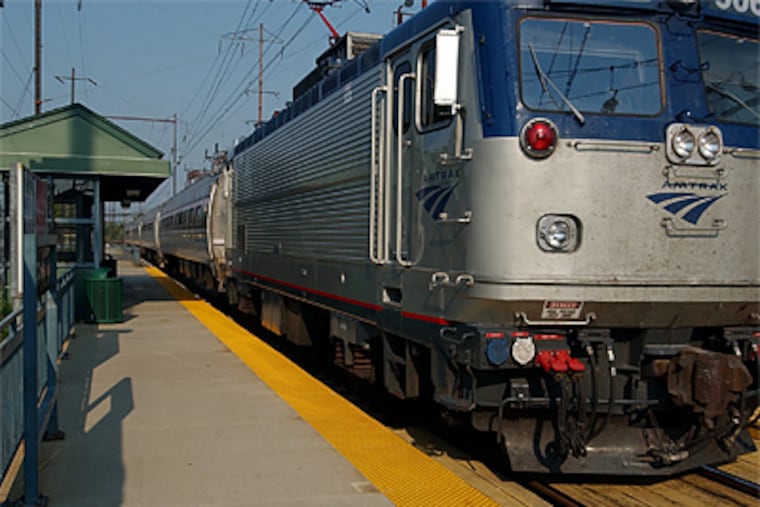Rep. Murphy: More Amtrak service in Bucks
With highways clogged and gas prices soaring, U.S. Rep. Patrick Murphy (D., Pa.) sees Amtrak as a commuting option for his Bucks County constituents who work in New York.

With highways clogged and gas prices soaring, U.S. Rep. Patrick Murphy (D., Pa.) sees Amtrak as a commuting option for his Bucks County constituents who work in New York.
Amtrak, however, does not share Murphy's view.
The financially strapped national railroad sees its limited Northeast Corridor seats as best utilized by full-fare spot travelers, not daily commuters paying discounted monthly rates.
Yesterday, those philosophies were set on a possible collision course when Murphy amended a funding bill to force Amtrak to consider increasing stops and lowering fares for riders using Bucks County's only Amtrak station.
That would be Cornwells Heights, a chronically underutilized stop in Bensalem Township that never came close to the ridership projected for it a decade ago. Today, Amtrak provides only two morning and two evening stops there - and the cost of a monthly pass to New York has gone from $555 in October 2005 to $972 today.
Only a handful of riders make that commute today; a few years ago, Murphy said, 26,000 riders annually took Amtrak from Cornwells Heights.
Yesterday, the U.S. House of Representatives voted 311-104 to authorize nearly $15 billion for Amtrak and other passenger railroads over the next five years. Murphy attached an amendment to the bill requiring Amtrak to evaluate service between Cornwells Heights and New York and, within a year, determine whether it should increase the number of stops or lower commuter prices.
"With more stops and lower fares, more people would use it," Murphy said. "The same trip takes twice as long as using SEPTA and then transferring to New Jersey Transit, and even longer if the commuter is driving."
Yet that is what many former Cornwells Heights commuters have chosen to do; a monthly NJ Transit pass between Trenton and New York is just $352.
"People obviously can't afford" to take Amtrak regularly, said Lou DeCree, 29, a Northeast Philadelphia resident who commutes from Cornwells Heights to his job as a certified public accountant in Manhattan.
"I'm lucky enough that my employer covers it for me," DeCree said. But when he boards the 7:22 a.m. train, he said, only 10 to 15 others are on the platform with him.
Not that Amtrak is struggling for passengers these days. Last month "was the biggest month in Amtrak history," said Cliff Black, an Amtrak spokesman. "We're headed toward a sixth consecutive year of record ridership."
Ridership in the current fiscal year, which began Oct. 1, is up 11 percent in the Northeast Corridor over the same period last year, Black said. Northeast Corridor revenues are up 16.5 percent for the same period.
At the same time, trains are at least 80 percent full on average, more so during peak hours between Philadelphia and New York, Black said.
"Capacity is a looming specter that we are looking at; we have a finite fleet," Black said.
Commuters, Murphy responded, "are Amtrak's most loyal customers. If there isn't enough space, perhaps they should consider adding more cars to the trains on what are their most profitable routes."
Black said Amtrak has begun making plans to replace its Northeast Corridor fleet, some of which is more than 30 years old. In the meantime, he said, Amtrak "will certainly follow through" on Murphy's amendment if it becomes law.
Black said Amtrak was "very pleased" with the funding bill. "It shows there is great support in Congress for expanded and improved passenger rail service."
President Bush, who opposes subsidies to Amtrak, has threatened to veto the legislation. Murphy said he hoped that bipartisan support for energy-saving measures would overcome Bush's resistance.